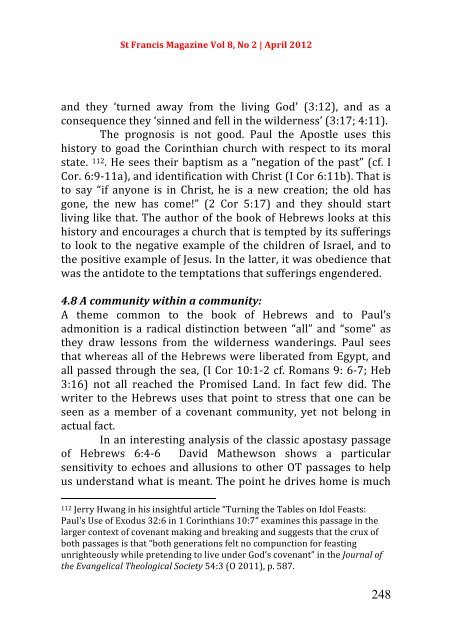Untitled - St.Francis Magazine
Untitled - St.Francis Magazine
Untitled - St.Francis Magazine
Create successful ePaper yourself
Turn your PDF publications into a flip-book with our unique Google optimized e-Paper software.
<strong>St</strong> <strong>Francis</strong> <strong>Magazine</strong> Vol 8, No 2 | April 2012 and they ‘turned away from the living God’ (3:12), and as a consequence they ‘sinned and fell in the wilderness’ (3:17; 4:11). The prognosis is not good. Paul the Apostle uses this history to goad the Corinthian church with respect to its moral state. 112 . He sees their baptism as a “negation of the past” (cf. I Cor. 6:9-‐11a), and identification with Christ (I Cor 6:11b). That is to say “if anyone is in Christ, he is a new creation; the old has gone, the new has come!” (2 Cor 5:17) and they should start living like that. The author of the book of Hebrews looks at this history and encourages a church that is tempted by its sufferings to look to the negative example of the children of Israel, and to the positive example of Jesus. In the latter, it was obedience that was the antidote to the temptations that sufferings engendered. 4.8 A community within a community: A theme common to the book of Hebrews and to Paul’s admonition is a radical distinction between “all” and “some” as they draw lessons from the wilderness wanderings. Paul sees that whereas all of the Hebrews were liberated from Egypt, and all passed through the sea, (I Cor 10:1-‐2 cf. Romans 9: 6-‐7; Heb 3:16) not all reached the Promised Land. In fact few did. The writer to the Hebrews uses that point to stress that one can be seen as a member of a covenant community, yet not belong in actual fact. In an interesting analysis of the classic apostasy passage of Hebrews 6:4-‐6 David Mathewson shows a particular sensitivity to echoes and allusions to other OT passages to help us understand what is meant. The point he drives home is much 112 Jerry Hwang in his insightful article “Turning the Tables on Idol Feasts: Paul's Use of Exodus 32:6 in 1 Corinthians 10:7” examines this passage in the larger context of covenant making and breaking and suggests that the crux of both passages is that “both generations felt no compunction for feasting unrighteously while pretending to live under God’s covenant” in the Journal of the Evangelical Theological Society 54:3 (O 2011), p. 587. 248







![Reflections on Surah Fatiha and the Lord's Prayer[1] - St.Francis ...](https://img.yumpu.com/49377951/1/184x260/reflections-on-surah-fatiha-and-the-lords-prayer1-stfrancis-.jpg?quality=85)








